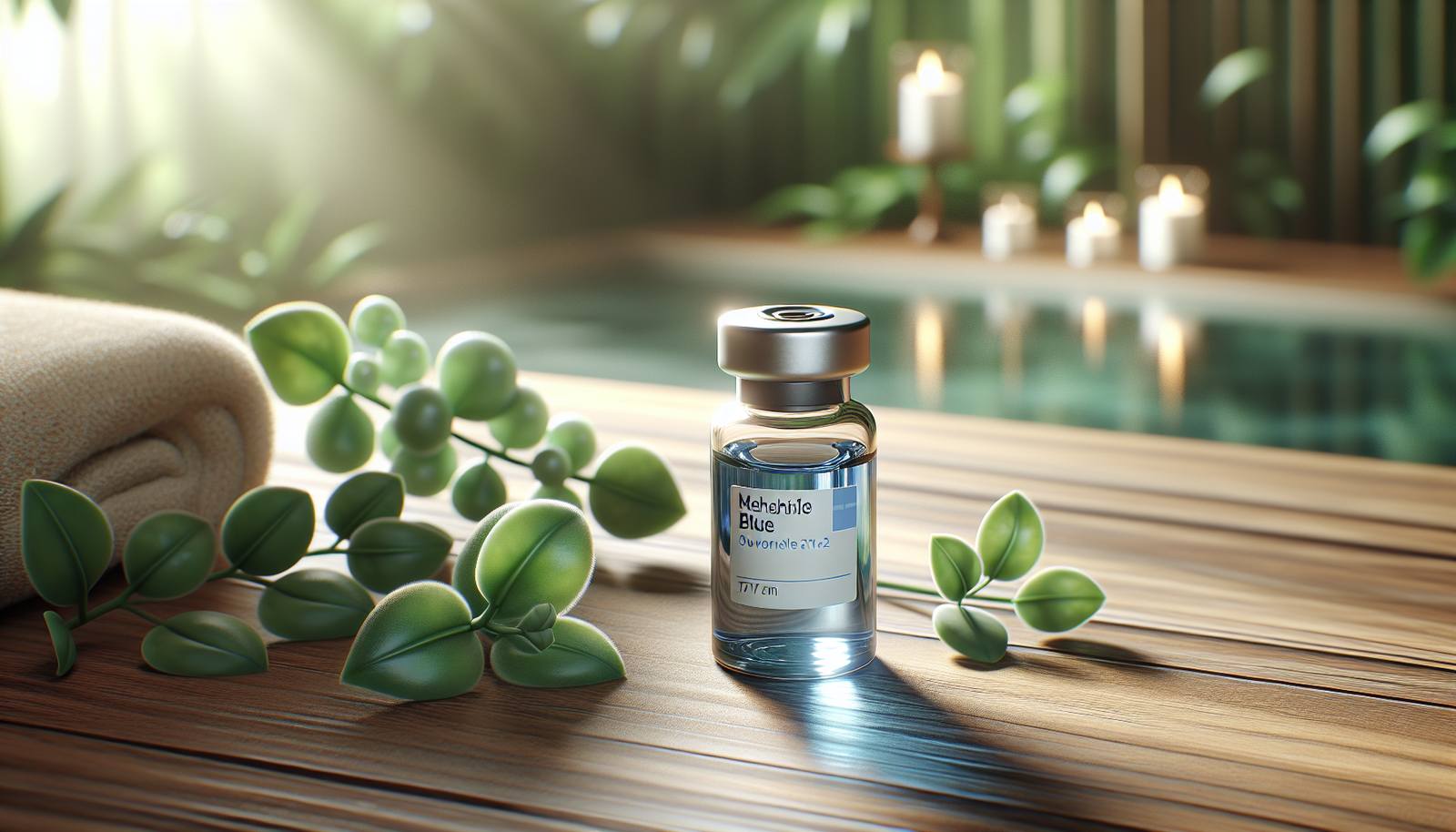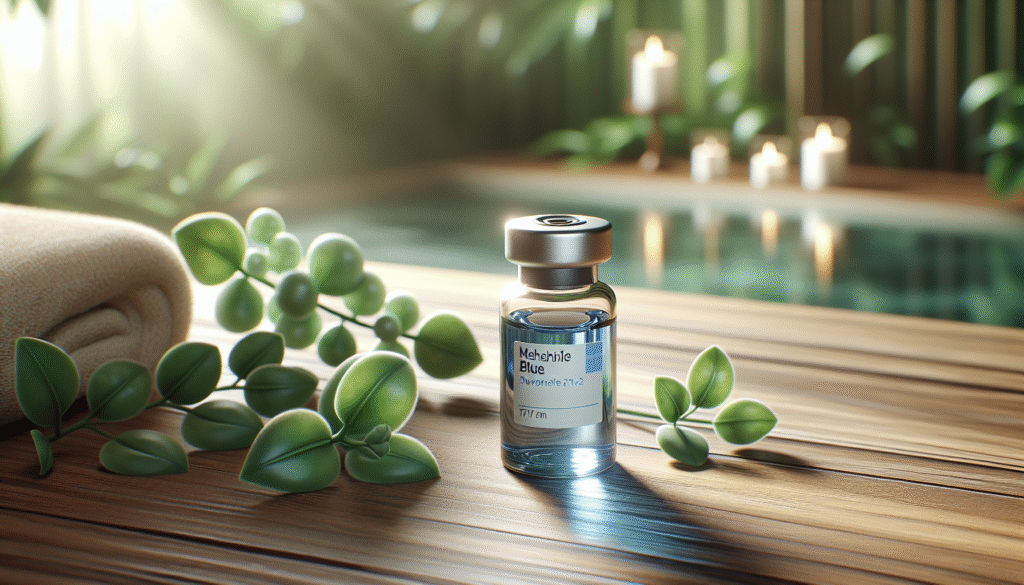
Have you ever considered the transformative effects that certain chemical compounds can have on your skin? Among the many substances touted for their rejuvenating properties, methylene blue stands out. This article provides a comprehensive examination of how to use methylene blue as a spot treatment for aging skin, detailing its effects, application methods, and precautions to ensure safe usage.
Understanding Methylene Blue
Methylene blue is a synthetic dye that has long been used in medicine for various purposes, including as an antiseptic and a treatment for certain methemoglobinemia cases. However, its applications extend beyond the medical realm into aesthetic and dermatological fields.
The Properties of Methylene Blue
Methylene blue possesses antioxidant properties, which can counteract oxidative stress in the skin. This property allows it to combat the damage caused by free radicals, contributing to the visible signs of aging such as wrinkles, fine lines, and hyperpigmentation. Additionally, it has been researched for its potential to promote cellular regeneration and enhance the skin’s overall appearance.
The Science of Aging Skin
Aging is an inevitable process that affects everyone differently. Understanding the biological changes that occur as skin ages is crucial when choosing treatments.
Biological Changes in Aging Skin
As you age, your skin undergoes a variety of changes; it becomes thinner, drier, and less elastic. These changes are largely due to decreased collagen production, diminished moisture, and variable levels of sebum being produced. The result is rough texture, sagging, and increased visibility of fine lines and wrinkles.
Key Indicators of Aging Skin
To effectively use methylene blue as a treatment, it is essential to recognize the indicators of aging skin. They include:
- Fine Lines and Wrinkles: Often located around the eyes and mouth.
- Age Spots: Small dark patches that develop on sun-exposed areas of the skin.
- Dullness: A loss of radiance caused by a decline in skin cell turnover.
- Sagging: Reduced elasticity leads to a less firm appearance.

Benefits of Methylene Blue for Aging Skin
Methylene blue offers several advantages for those looking to improve the condition of their skin.
Antioxidant Effects
One of the primary benefits of methylene blue is its potent antioxidant properties. By neutralizing free radicals, it can help reduce oxidative stress, a significant contributor to skin aging.
Enhanced Cell Regeneration
Methylene blue has been shown to promote mitochondrial function, which is crucial for cellular energy production. This enhancement can lead to improved cellular turnover and skin repair, resulting in a more youthful appearance.
Anti-Inflammatory Properties
Inflammation plays a significant role in skin aging. Methylene blue can help to mitigate inflammation, potentially reducing redness and irritation often associated with aging skin.
Preparing for Treatment
Before applying methylene blue, it is vital to prepare your skin and ensure that you are using the treatment correctly.
Skin Assessment
Assess your skin to determine the areas you wish to target, such as age spots or fine lines. This assessment will inform how much product you need and what areas require the most attention.
Patch Test
Always perform a patch test before applying any new product to your skin. Apply a small amount of methylene blue to a discreet area and wait 24 hours to see if any adverse reactions occur.

How to Use Methylene Blue as a Spot Treatment
Using methylene blue effectively requires a clear understanding of its application. By following these precise steps, you can maximize the benefits while minimizing risks.
Step 1: Gather Your Materials
To use methylene blue as a spot treatment, you will need:
- Methylene blue solution (high purity, cosmetic grade)
- Cotton swabs or pads
- A clean container for mixing (if necessary)
- Optional: Serums or moisturizers you usually use
Step 2: Cleanse Your Skin
Start with a thorough cleansing of the targeted area to remove any makeup, dirt, or oils. This step ensures that the methylene blue penetrates effectively into the skin.
Step 3: Application of Methylene Blue
Using a cotton swab or pad, apply a small amount of methylene blue directly to the spots you wish to treat. Ensure that you are only applying it to the specific areas and avoid surrounding healthy skin as much as possible.
Step 4: Allow it to Absorb
Let the methylene blue absorb into your skin for about 20-30 minutes. During this time, you might notice a slight tingling sensation as it works on the targeted area.
Step 5: Rinse Off
After the absorption period, rinse the area thoroughly with lukewarm water. This step ensures that any excess product is removed and helps to prevent any potential staining.
Step 6: Follow Up with Moisturizer
Once you have rinsed and dried your skin, apply a gentle moisturizer. This addition can aid in hydration, helping to restore any moisture that may have been stripped away during the treatment.
Frequency of Use
Determining how often to use methylene blue for spot treatments is crucial for achieving optimal results without overwhelming your skin.
Recommended Usage
For best results, it is advisable to start with treatments once a week. Monitor your skin’s reaction, as some individuals may experience sensitivity or irritation. If your skin tolerates it well, you may consider increasing usage to two to three times per week.
Precautions to Consider
While methylene blue can be beneficial, there are precautions you must take to prevent adverse effects.
Potential Side Effects
- Staining: Methylene blue is known for its vibrant color, which can stain clothing and skin. Exercise caution during application.
- Skin Reactions: Some individuals may experience redness, irritation, or an allergic reaction. Always perform a patch test prior to full application.
When to Avoid Usage
Avoid using methylene blue if you have open wounds, severe skin conditions, or a known allergy to the compound. Additionally, if you are pregnant or nursing, it is advisable to consult with a healthcare provider before use.
Complementary Treatments for Aging Skin
Incorporating other effective treatments alongside methylene blue can enhance your skincare regimen.
Retinoids
Retinoids are vitamin A derivatives that are widely used for combatting signs of aging. They promote cell turnover and collagen production, making them a powerful ally in your anti-aging arsenal.
Hyaluronic Acid
Known for its hydrating properties, hyaluronic acid can plump the skin and reduce the appearance of fine lines. Using it in conjunction with methylene blue can enhance overall skin moisture.
Vitamin C
As another potent antioxidant, vitamin C can work synergistically with methylene blue to neutralize free radicals and brighten the skin’s complexion.
The Role of Diet and Lifestyle
Your skin’s health is closely linked to your dietary choices and overall lifestyle.
Nutrition for Healthy Skin
Incorporating a diet rich in antioxidants can bolster the skin’s defenses against aging. Foods like berries, leafy greens, and nuts are excellent sources of the nutrients your skin craves.
Hydration
Staying adequately hydrated is equally crucial. It helps maintain skin elasticity and can improve overall skin texture.
Sun Protection
Always protect your skin from UV damage by wearing sunscreen. UV exposure is one of the primary causes of premature aging, making protective measures essential.
Seeking Professional Guidance
Consulting with a dermatologist can provide personalized recommendations tailored to your specific skin type and concerns.
Benefits of Professional Insight
A professional can offer insights into the best practices for using methylene blue and can identify other treatments that may complement your skincare regime.
Regular Skin Check-ups
Regularly scheduled dermatological check-ups can help you stay on top of your skin health, ensuring any concerns are addressed promptly.
Conclusion
Using methylene blue as a spot treatment for aging skin holds promising benefits thanks to its antioxidant and regenerative properties. By understanding its application, potential side effects, and complementary treatments, you can navigate this innovative option for enhancing your skin’s appearance.
As you embark on this journey, remember that individual results may vary; patience and consistent care are key. For many, the pursuit of youthful, glowing skin is not just about products; it involves a holistic approach that encompasses lifestyle choices and professional guidance. By integrating methylene blue into your regimen, you may find it to be a valuable addition in your quest for revitalized skin.